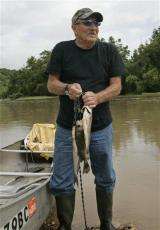River heals as lawsuit against Big Poultry looms

(AP) -- David Overbey is no scientist, but he says a person doesn't have to be to see how much the Illinois River has improved in recent years.
Overbey, a 67-year-old retired laborer who spends his days fishing the river in the foothills of the Ozarks in eastern Oklahoma, said the water is clearer now than it was 30 or 40 years ago, and the drum and channel catfish he catches are bigger. And other locals, too, say the river is slowly beginning to heal after decades of deterioration.
Some trace the roots of the recovery to 2005, when Oklahoma brought a pollution lawsuit against the Arkansas poultry industry, suggesting the threat of legal action may have spurred the companies to do better at policing themselves.
"The water quality is getting better, and this year, especially, we had very little algae," said Archie "Trey" Peyton III, 35, a former environmental consultant who now runs the Peyton's Place float company.
"There's got to be a reason for that, which to me it follows that the last two years that most of the poultry litter in this region has been trucked out. But it looks to me like that's making an impact on the river," Peyton said.
But Oklahoma says the industry needs to do more, and its closely watched case against 11 companies - including food giants Tyson Foods Inc. and Cargill Inc. - goes to trial Thursday.
It's been a long-standing practice among poultry farmers in the Illinois River watershed to spread their chickens' droppings on their fields. But as big business took over the production of broilers, the amount of waste being spread on local fields ballooned - to an estimated 345,000 tons annually in recent years, according to Oklahoma.
Rather of disposing the waste in safer but more expensive ways - including burning it as energy, processing it into pellets or composting it - the state argues that Big Poultry has chosen the easiest, and cheapest, route. Runoff from the waste spread on the fields has polluted the Illinois River with harmful bacteria, degraded its water quality and caused algae blooms, the state argues.
The bacteria in the water threatens the health of the tens of thousands of people who use the river recreationally each year, and of the many businesses that rely on it.
The industry argues that Arkansas and Oklahoma sanctioned this practice by issuing farmers permits to spread the inexpensive waste.
The companies say they've also taken steps to reduce the amount of waste spread on the fields. Records provided to The Associated Press by the poultry industry show that nearly 290,000 tons of chicken waste have been trucked out of the area between 2005 through last month.
The four-year estimate, which does not include litter hauled away by the Oklahoma Conservation Commission, still is about 55,000 tons less than the amount of waste produced in just one year in the watershed.
But the industry says it's a start, and says it's spending millions of dollars researching alternative uses for chicken waste and has bankrolled various river improvement projects.
Other states considering taking on Big Poultry are closely watching the Oklahoma case, which is expected to last several weeks.
In the meantime, the poultry and tourism industries will continue to share the lush, 1 million-acre swath of land that extends from northeastern Oklahoma into western Arkansas, with its thick forests, babbling brooks and 1,800 low-slung chicken houses that dot the landscape.
Those who live and work along the river say its health appears to be improving. There's the fatter and more plentiful fish, for one, and less of the thick algae that once coated the river's bottom like shag carpeting. Local merchants say they logged banner seasons outfitting the tens of thousands of tourists who flock to the river each year.
"This river is better now than it was 20 years ago," said Jack Spears, a retired college professor who owns Arrowhead Resort, the second-largest float company in the area. His operation equips roughly 20,000 customers a year for trips down the river.
Spears has spent most of his 75 years in this county and remembers when he could look at water so clear in the Illinois that 10 or 12 feet down seemed like 6 inches.
"If I was in (the poultry companies') position, I'd say, 'hey, let's police our act. Let's clean up our act, or they'll be forced to by someone else,'" Spears said.
The other defendants named in the lawsuit are Cal-Maine Foods, Inc.; Tyson Poultry Inc., Tyson Chicken Inc., Cobb-Vantress Inc., Cargill Turkey Production L.L.C., George's Inc., George's Farms Inc., Peterson Farms Inc. and Simmons Foods Inc.
©2009 The Associated Press. All rights reserved. This material may not be published, broadcast, rewritten or redistributed.















